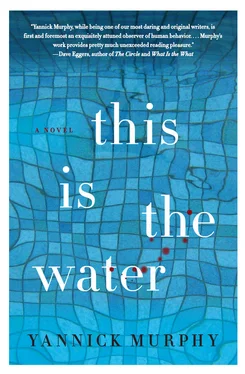It’s the ringing of your cell phone that interrupts the moment. It’s not a number you know. When you answer the phone it’s Sofia’s voice. She must have borrowed a phone from a friend. “Mom, where are you? We’ve been waiting ten minutes. Practice ended early,” she says.
“I’m coming. I’ll be there soon,” you say. “Oh, and be safe. Don’t go outside. Wait for me in the foyer.”
Paul locks up his office and walks out with you to your car. “Have a good night,” he says, before you get in. You cannot look at his face. You’re afraid if you do then you might want to continue with the kiss, right here in the parking lot, where someone might see him who knows him and knows he’s married. Funny, you think while driving, that you consider the kiss interrupted and not ended, as if it were a thing to be continued at a later time.
Before Kim was murdered, some parents would drive their cars up to the entrance of the facility and wait for their swimmers to hop in the back. Some parents would sit in the parking lot and wait while reading a book. Some parents would park their cars and go into the facility and wait in the foyer, talking to other parents, about swimming or about school, or about anything, considering how they are all friends and see each other so often they can talk about anything, or sometimes they would just complain about how long it takes their swimmers to get out of the shower and get dressed. Some parents would barge right into the locker rooms and yell at their swimmers to hurry it up, while their swimmers were drying off and struggling to put on socks over wet feet, or while their swimmers were fooling around, the little ones hiding inside the metal lockers, bursting out like jack-in-the-boxes and screaming, “Surprise!” and the older ones chatting away with other girls about books and clothes and teachers. But now, since Kim has been killed, all the mothers have been going into the locker rooms and making sure their children are escorted into their cars. You would usually wait in the foyer for your children, but today Sofia and Alex are waiting outside for you as you drive up, and waving you down frantically, annoyed with you because you happen to be late, when recently, ever since Kim’s death, you have picked them up straight from the locker room. You’re annoyed with them too. You told them to wait inside and not go outside. It’s then, when you see them waving as if they’ve been marooned on an island, that you remember what Paul said to you in his office, that the red Corvair had Illinois plates. He hadn’t told you that before, you are almost sure of it. Wouldn’t you have remembered that they were Illinois plates? Why is it that he keeps layering on the details about something that he at first said he knew nothing about at all? And why did he kiss you then, right after he said it? Was it to make you stop thinking about Bobby Chantal? You realize that the kiss made it difficult for you to understand what really happened that night he was with her. The kiss was like a layer of fog that crept inside of you, clouding up what might otherwise be clear, and masking whatever you heard.
“I’m starving!” you daughters say in unison when they get in the car, and to keep them quiet so that you can think about the kiss and the Illinois plates on the long drive home, you stop and let them buy doughnuts, only briefly thinking about what an unhealthy food they are.
T homas says the universe is expanding like a balloon, and that every year we are twenty-two miles farther apart from other celestial bodies. You wonder, for a second, if he’s making an analogy between you and him — that every year the two of you are drifting farther apart, but of course you know that’s not how he thinks. He doesn’t think about relationships. He thinks about actual celestial bodies. You want to know, then, why we bother trying to visit other solar systems when it’s just going to be harder to do so every year. We should just give up now, you think, while looking down at the goose. The goose is two stories below on the ground and you can see the goose turning her head and looking up at you with one eye while you look out the window. “Hello, there, goose,” you say, and the goose tilts her head some more. The goose, you think, does not care about the universe, or the expansion of it, and neither does she care about the neighbors or the road beyond. The goose maybe cares about the two chickens that eat her food, and the dog that eats her food, and maybe she cares about the fox that trotted off with the rooster in its mouth a while ago. The expanding universe is not on the goose’s agenda, you think. This is you thinking that you need to stop thinking about Paul, Bobby Chantal, and the red Corvair, that those things shouldn’t be on your agenda, because they are expanding your universe beyond proportions you can understand or are comfortable with. In order to keep your universe small, the way you like it, you start folding the towels. There are always so many towels, and you like to feel the nub of the terry cloth against your dry fingertips because your fingers are always dry from swimming in chlorine. You have to put away your clothes and Thomas’s clothes, and then the girls’ clothes, and then the rags that go in the rag chest, which are really not rags but just an assortment of napkins and dish towels you keep by the dining room table. Often, a stray sock or a pair of underwear gets thrown into the rag chest too and someone during a meal will go get a rag to wipe their face and dig into the rag chest without looking carefully at what they are picking up and they will end up wiping their face with a gym sock or a flowered panty instead, which gets everyone laughing at the dinner table, but not for long, because the meal has to be finished quickly, you and the girls have come back from swim practice so late and now there is violin to practice and now there is homework, and where are the protractors, the rulers, the colored pencils for filling in landmasses and rivers on maps? And how did this happen, Thomas asks you before bed, that Alex swims more than she studies? How did we let that happen? The swimming won’t get her anywhere in life. How is it that our daughter knows nothing about how the plates move? About how magma was formed? About what igneous rocks are? About what sedimentary means? And you don’t say so, but you are not so sure yourself. Sedimentary sounding awfully similar to sedentary, and does this mean they are rocks that formed by barely moving, and is such a thing even possible? Thank goodness it is night now, the lights are out, the dog has settled against the door, the engine of the car out in the driveway has finished making its tick-tick-ticking sound, the owls have begun their calling, the swim suits and towels are all hung up, your daughters have practiced their violins and have completely memorized “Perpetual Motion.” And your mind’s suddenly able to recall that sedimentary means rocks formed by layers, so now you can go to sleep with one less thing on your mind. This is you thinking what a fine job you’re doing keeping Paul and Bobby Chantal and that red Corvair out of your mind.
This is Chris at home, looking through boxes in the attic at three in the morning and finding the handgun her father once owned and kept behind the counter of his store just in case there was trouble. This is Chris remembering Beatrice, the babysitter she had as a girl who was raped. This is Chris finding the box of bullets alongside the handgun. This is Chris remembering Beatrice, how every night she would fall asleep next to Chris. This is Paul asleep downstairs, having a nightmare that he has found Bobby Chantal again. He is holding her in his arms. Her throat is slit. “Oh, Bobby,” he is trying to say in his dream, trying to bring her back to life, but to anyone listening to him it sounds like “Oh, baby” instead, because words you say in a dream sound distorted to others who are awake. In short, it sounds like a dream he’d want to have, not a nightmare. This is Chris in the attic, hearing through the floorboards Paul saying, “Oh, baby,” and thinking to herself that he is dreaming about the woman he’s seeing. This is Chris not caring so much now. In a world of ten thousand things, what’s more important? Her husband with another woman, or a killer who’s killing young girls, girls on the same swim team as Cleo, girls almost as young as Cleo, even? She takes the handgun and the bullets with her down the rickety attic ladder. She hides them in her bedroom, where she keeps her winter sweaters folded up and encased in a plastic garment bag. Again Paul moans in his sleep. She doesn’t mind it now. She is thinking of how she will find that killer.
Читать дальше












